
MOONSPELL – A Grand Stand
Anthony Morgan
May 2012
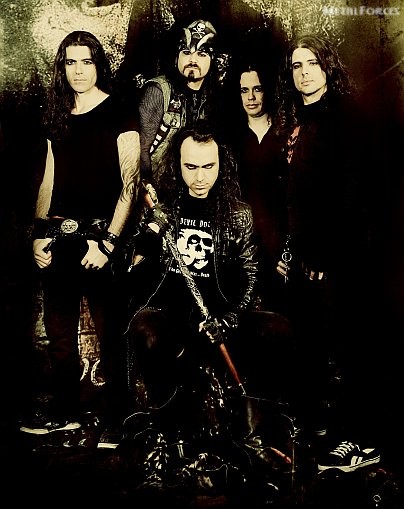
|
Portuguese gothic metallers Moonspell publicly disclosed the fact that they had inked a three album contract with Hanover, Germany-based record label SPV on November 9th, 2005. The relationship lasted for two studio full-length affairs in the shape of April 2006’s Memorial and May 2008’s Night Eternal, SPV submitting an application for insolvency on May 25th, 2009. Moonspell consequentially signed a global contract with Napalm Records, an occurrence revealed on December 20th, 2011.
“Well, it was quite expected in a way,” says Fernando Ribeiro of SPV’s demise, Ribeiro being the vocalist and founder of Moonspell. “When you are part of a company, and see where they are going… SPV used to be the biggest independent distributor operating from Germany, but then they started signing bands. When we left Century Media, they were really into Moonspell and the idea of having us. It was quite a match at the time, because Memorial boosted ourselves and everyone at SPV was quite excited about the record. We then did Night Eternal which was brilliant as well, but in the process I saw them signing really huge bands like Whitesnake and Mötley Crüe. I started thinking ‘Well, that should be expensive,’ and we all know that these bands – for how great they are – don’t reach the numbers they reached in the 80s. We saw it coming that SPV would have problems, and actually were probably going towards a dead end. When they declared bankruptcy it was strange for their bands. Even though we’ve been signed to labels and they have an important role in the scene, we always try to also be an independent band.
“We changed labels here and there. Sometimes the labels grow and they have a structure, but don’t get things done. Basically we always got used to progressing ourselves; when we were doing this Alpha Noir album we were an unsigned band, and we were financing everything. After the album was ready, we were then just putting on the final touches. Then we started looking for a label, and Napalm was quite furious because they have a very similar background history as Moonspell. They started off as an underground black metal label, and nowadays they have something to prove to the other labels. They have a voice and they have a presence in the scene, so they’ve cherry-picked bands like us, Tiamat, and Monster Magnet in order to bring them more credibility. They pay off these bands with enthusiasm, something I wasn’t feeling on a bigger label. I really feel that it will be a great collaboration because they were totally open to our ideas, and they didn’t mess up with anything. I’m really, really glad we’re a Napalm band, and it sounds good to say to your friends ‘My record label is called Napalm, so beware.’”
Sharing labelmates like Whitesnake, Motörhead, Iced Earth, Helloween, and Saxon to name a few, one might assume that Moonspell was lost in the shuffle. “Not really, because they divided the job among a lot of people,” the mainman corrects. “We actually benefited from having larger bands on SPV because they work with true, professional promoters, and that worked for the more underground bands they had. They did a very good for Moonspell but at the end of the day, yeah, it’s quite hard when you’re fighting for something at a label and your counterparts are Motörhead or Whitesnake. It’s not quite a fair fight for the more underground bands. These bands probably took all the money that SPV had to go on, but I think SPV always did a decent job of investing in other bands – they had Kreator, and they had Kamelot. They had bands that actually have grown in a market affected by a big recession, and I think they really struck a chord there. Unfortunately it cost them their company (laughs).
“That wasn’t much of a serious problem for us though, because everything was very smooth. When the company filed for bankruptcy, we decided to settle the accounts with money and some other stuff. We were contracted to the label, but they couldn’t exercise that option. The label wasn’t able to release our record in a proper manner. It wasn’t that dramatic or painful getting out of the deal with SPV because the deal wasn’t valid anymore. The moment they became insolvent, everything else was cancelled really.”
Alpha Noir and Omega White constitute a double-album, the Moonspell fold submits. “The album takes a big picture of what we’ve done so far as a band,” Fernando reckons. “It also shows even more where we’ve come from, our influences, and what we like to do. We did the albums Memorial, Night Eternal, and Alpha Noir – the first album of the two – that were quite intense and quite powerful, so we had a hangover from writing such intense music (laughs). We were writing songs that had a different nature in a way. Instead of trying to put all of this on a record, as we were writing more songs anyway we decided to split the band into two at least creatively, and have two different sets of songs. We weren’t thinking about making a double-album or whatever, but it got so interesting for us that we decided that the principle of having two albums or two sides was actually what we wanted to present to the crowds. Personally I think that to have the whole experience is to have a better picture of what Moonspell is in 2012, and also everything from our catalogue. I feel that with this album, we covered every aspect and every sensibility as songwriters.
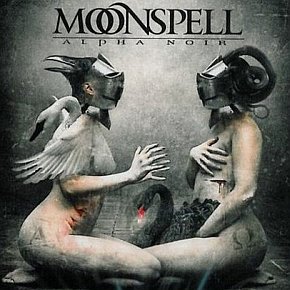
|
“When it comes to releasing the album I think everybody was advising us to release Alpha Noir and then Omega White afterwards, but we didn’t want to break the artistic integrity of Alpha Noir and Omega White. We tried very hard, and fortunately Napalm was open to it. They weren’t thinking about the cash flow, the touring, and the problems we will face, but to keep it as we created it. Obviously a double-album will probably be too much for some of the fans, so we came up with the idea of having a special edition which has both albums, that the enthusiasts will get for sure. I believe that nowadays with the internet though, everybody will have the chance of coming into contact with it anyway. Sometimes you have to choose the lesser of two evils; we thought breaking our artistic integrity would be the worst decision. This way, everybody is happy.”
A thrash influence flavours Alpha Noir. “We wanted Alpha Noir to be an album that was more alive really, and it all started when we played the 70000 Tons Of Metal,” the frontman discloses. “There were a lot of thrash bands there. Our guitar player Ricardo (Amorim) was hanging out with Testament’s guys and watching all the shows, so one thing led to another, and he started to write stuff more focused on this thrash and speed metal influence. I then got really excited and I really liked thrash metal, probably more obscure bands like Onslaught or Artillery, and Annihilator’s first album – it’s a masterpiece. We got really excited because thrash metal was a big pleasure when we were teenagers, and now that we’re not teenagers anymore – we are heading fast into our 40s – it was great to to experiment in a way, and to see how it also fitted with our way of making music.
“It fitted really well because I think the guitars are very alive, the riffs are more memorable, and everything is very groovy in a way. It mixed with our darker sound. You’ve heard all these riffs before, but it’s delivered in a more original way. Of course, many people are already thinking or are afraid that we’re jumping into the thrash revival bandwagon. We’ve toured with some of those bands and it’s interesting, but not so much that we wanna score a tour with Legion Of The Damned or Municipal Waste. It’s just a musical influence, but for us it made all the sense to bring it to the table. Now I think when we’re practising for the shows, it really sounds alive. We wanted an album that passes on enthusiasm ahead of doing something different and probably more complex.”
Thrash metal isn’t Alpha Noir’s sole ingredient, however. “I think the thrash influence is really obvious and it’s a more guitar-oriented album, but I think there are certain characteristics we started to explore more,” Fernando notes. “We played faster music on Memorial, Night Eternal, and our last Century Media album The Antidote. I think there was this great album in 1996 made by Carl McCoy from Fields Of The Nephilim; he made this project called Nefilim, and did this album called Zoon. For me that’s really the blueprint of gothic metal over anything else; if you know this album you’ll recognise it’s very dark sometimes – dark and gothic – but also it sounds like Slayer sometimes. It has really heavy, heavy guitars and double-bass drums. It’s a great example of how you can mix the metal world and the gothic world without necessarily having to use the same resources like female vocals or orchestration. Sometimes there’s a very fine line between what’s sublime and ridiculous, so the gothic metal style is a little bit always hanging on a wire. It’s very easy when you express these kinds of emotions to be a little bit over the top, let’s say.
“I think that album with loud and deep guitars and deep vocals was really influential for us, and besides the thrash influence that’s something we always like to do. When people call us dark metal or gothic metal, we don’t want to take away the metal part. I still think it has to have these epic moments and atmospheric moments as well though. I think that Nefilim album was really influential, and was something that Moonspell really, really loved at the time.”
The usage of female vocals as well as orchestration to augment gothic metal is generally excessive, arguably. “I think it’s not what you use, but how you use it,” the singer emphasises. “I think when you have these raw materials you really have to be smart and do it in a way that is not ridiculous, otherwise it creates a strange effect. When you wanna be majestic or big by adding female vocals or orchestration, what you’re doing is probably creating second-rate soundtracks. They don’t really master orchestration techniques. Gothic metal always fall into this routine of beauty and the beast. Of course I love female vocals and we have our history with female vocals with Moonspell as well, but we always found it a special arrangement, something to add to our music. Not all the bands are, so I feel that sometimes the female fronted bands are very one-dimensional. They’re always kind of the same, and it’s the same for almost everyone.
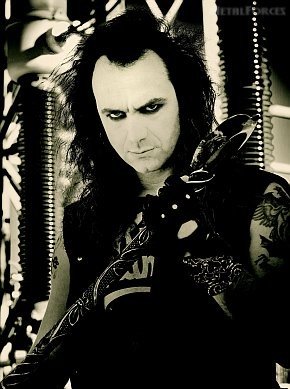
|
“There are some bands that always stand out from the pack, but in reality, some people really hate gothic metal because they have certain impressions of the genre. There’s probably much more to the style than meets the eye. Moonspell always thinks a lot, and always tries to do something new with the female vocals. For instance, on Night Eternal we didn’t invite just any singer; we invited Anneke van Giersbergen, formerly of The Gathering. She was there, and she was probably the forerunner for female gothic metal vocals when she was in The Gathering. We never really actually played or met with an orchestra because many bands in metal have already done that, and some with good results. I really like Septic Flesh for instance because the arrangements are really crazy and out of the ordinary, but with orchestras sometimes you can listen to that on soundtracks in a better form.
“We kind of like our dreamy keyboards that sound like the 80s or the 90s, because sometimes I felt keyboard parts were better. I really like the sound. I wouldn’t like it if it was played by an orchestra, because it would sound different. There are a lot of keyboards – especially on Omega White – and I really, really like them because without a lot of means you can create something big. Sometimes with an orchestra, you just overwhelm. I think that so far, keyboards really make things happen for Moonspell. Also, I think that orchestras aren’t special anymore. Everybody has done that.”
Alpha Noir shares common traits with 2006’s Memorial, and April 1995’s Wolfheart. “I think the album that it’s probably more in line with is Memorial,” Fernando acknowledges. “People that listen to it say it reminds them of Wolfheart as well, but I wouldn’t say musically. I think this album has the enthusiasm of Wolfheart, definitely. After making so many albums and having created history as a Portuguese band, sometimes we’ve had stages in our mind where we were very at ease with ourselves. With this album, everything was very arduous to do though. It was a lot of hard work, but we were enthusiastic about it. There was this raw power about this album that probably reminds people of Wolfheart, but it’s always dangerous to talk about the past because I feel going back to the roots is impossible for the band. I think when you have a classic album from European metal or from the UK, people always tend to put pressure on the band. I think an album is just a classic one though when the audience makes it classic.
“In the 90s, people were very open to listening to probably bands like My Dying Bride, or Paradise Lost, or Moonspell, or Tiamat, or other bands. Then there was a darker period for us where people were listening more to bands such as Rhapsody and whatever, and didn’t really care about us. That started at the end of the 90s, but fortunately it’s coming back slowly but surely. This band still has a lot of fans; we have two generations listening to 90s metal again. So yeah, even though our past was quite unexpected for us but turned out particularly well, actually we are at risk of lying to our fans by saying this album goes back to the roots. No, it has influences from our roots. It has some other stuff we learnt along the way musically and personally as well, but it’s always a new album. I think people never expect Wolfheart Part Two or Irreligious Part Two, but expect a good album. I think that’s what we have right now.”
The Great Recession that has blighted the globe since the late 2000s shapes the lyrics authored to accompany Alpha Noir. “Even though I always try to keep a line through all the lyrics, I always end up writing about mankind’s biggest issues,” the lyricist concedes. “I would say this album is a little bit different. It’s more in-your-face when it comes to the lyrics because it’s an album that is born in a time where from Europe to New York, a man goes to office… and my country Portugal is done. This creates not only a financial crisis, but also people lose their way of living. They start hating their lives, and start hating their country. Sometimes it’s pretty harsh to go out in the streets of Portugal and see how desperate people are because a guy had a bad run, woke up the wrong side of town, went to his computer, and labelled your country junk, just overlooking years of history, culture, and all of that. Music is definitely our vehicle. In a way Alpha Noir is an optimistic album because it motivates people to fight for themselves, and to be able to do that I think you really have to regain your self-esteem.
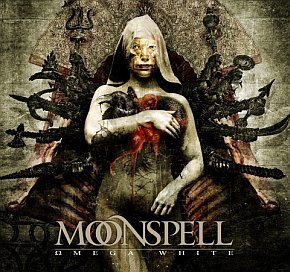
|
“I think the old order of the world isn’t working anymore, especially for countries like Portugal or Greece or Egypt. Everything is very confusing at this time, and that ended up in our album. I feel Alpha Noir is like getting into an arena in a way, and you’re all affected by the smell of sweat and fear. There’s also a little spark of revolution, of changing your life, by doing something to achieve the next level. I picked Alpha Noir as a title because ‘alpha’ is the beginning, and the first letter of the Greek alphabet. The order of things isn’t well, but I think in the end people will become more human and they will better understand what is fear and what is evil. I also think a musician always has a responsibility probably not to change the world, but at least to give a new perspective or their light to a certain subject, and to share it with the people that are kind enough to buy their music.”
Omega White, meanwhile, pays homage to root musical influences such as Sisters Of Mercy and Type O Negative. “I think it’s an album where you can really recognise those influences,” Fernando admits. “Many times I listen to what’s new in goth and dark rock, and I always find myself coming back to the Type O Negative and Sisters Of Mercy records. In a way, they cannot be surpassed. Also, when I meet different people who are into Moonspell, sometimes they don’t know about Fields, Type O Negative, and Sisters Of Mercy, and that is something really bad to happen. It’s also our mission to give back something to these bands that have so deeply influenced us. Omega White is basically the Type O Negative and Sisters Of Mercy in us; the catchy songs, the big vocals, the female vocals as well, more uncomprising songs, and an even more personal album. This is like a depository of our feelings after Alpha Noir. After the arena comes the healing room, which is Omega White.
“When you listen to it, you’ll recognise very easily those kinds of influences. Some people who’ve listened to it have said it’s close to our album Irreligious from 1996, and even though it’s not Irreligious Part Two I can see what they’re saying. It’s another eight songs which are very vibrant, and very catchy. It particularly reminds you of a time when we were all happier with our lives, and people were more into music (laughs). It’s a tribute, but they’re not cover versions. They’re original songs, but they pay respect to all of these bands. Many of these bands are either not in business anymore or they’re doing just one-offs, so it’s quite important that our fans know where we come from and where gothic comes from. I think it’s a nice introduction to the bands that have influenced us so much.”
More subtle influences additionally surface on Omega White. “I would say that of course we always kept an open mind,” the founder observes. “Even when we were listening to more underground bands and extreme music, there were always these bands we love and also some indie bands. At the time they were more interesting, and they did something really dark. Pedro our keyboard player is really into that style. There’s Johnny Cash as well, the American Recordings albums. There’s a little bit of everything in there that we listen to, that we considered to be Omega music. It was all a little bit personal, and they all ended up there in the songs of Omega White.”
Similarities can be drawn between Omega White and two past Moonspell albums, namely July 1996’s Irreligious and January 1998’s Sin. “They’re the blueprints for Omega White definitely, because of the songs, the arrangements, the lyrics, and the intention,” Fernando verifies. “It isn’t repetition, but also, Alpha Noir is album number nine and Omega White is our tenth album. Basically, it’s quite amazing that number nine and number ten can pick out things from our own discography. One thing we always wanted to do with Moonspell – and it’s hard – was to be recognised by our own sound and that was always very, very important, that people could recognise something they would connect with Moonspell.
“I had this impression when I first listened to Omega White after the mix, because of the sound and the togetherness of the songs. Even though Irreligious has its differences, I think it’s one of the albums where the songs are more together. That’s why we play them so often live, because they have a context and they have a colour. We were basically tired of making albums where the songs were very different from each other. That’s also why we did a double-album. I think the togetherness and also the studio sound is very dry. It’s very, very similar to Irreligious, but you have to fast forward a lot of years because Irreligious is from 1996 and a lot of things have changed. That comparison is more or less right on the money though.”
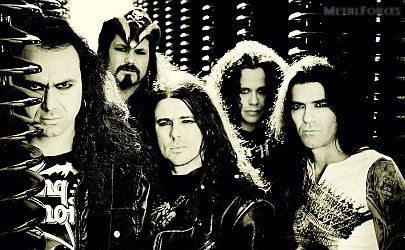
|
A more personal demeanour characterises Omega White’s lyrical preoccupations. “If I compared it to Alpha Noir, Alpha Noir is like someone screaming in your face while Omega White is more the murmur in the lips, more let’s say an inner voice,” the composer distinguishes. “I took care of the bigger, epic subjects on Alpha Noir, and that allowed me to have a lot of freedom to make Omega White more of a depository of emotions. There’s everything there, and it’s definitely more personal. There’s the broken hearts, friends who’ve died, people you admire who’ve died. It’s an album that goes very much in that direction. I see Omega White as a room – a confession booth – where you confess your sins or your wishes.
“There’s topics like heartbreak, loss, and also darker emotions like wanting to have someone who you can’t really have. All these subjects were basically also covered by bands such as Type O or Sisters. It’s more that kind of album, but I think the white colours also give a kind of tranquillity to the album because sadness and melancholy doesn’t have to be a violent thing all the time. Especially for the Portuguese people it’s something that just affects us daily, but we have learnt to handle and share the same oxygen with in a calmer manner. I think Omega White is the impression of that direction.”
Country artist Johnny Cash’s American Recordings period – lasting from 1994 until his death in 2003 at the age of 71 – influenced Omega White, as Fernando alluded to. In that regard, the Portuguese musician reflects on his life as well as past mistakes. “I think it’s almost impossible not to do that,” he feels. “I’m 37, nearly 38. During these last three or four years, my life has changed quickly in all aspects. I was kind of waiting for an album where I could tell that story probably through metaphors and obviously through lyrics and poetry, because I don’t like to push things. I think music is about magic and seduction and romance, and not giving away everything as well as mouth feeding people. I do not name any names. I do not just tell about an experience from minute one up until it ends, but yeah, I think there’s a lot more of ourselves on the album like the things we crave for, and everything that really inspires you to make a song or to make a lyric. It’s always impossible to have something you can’t have, but you can complain about that. That’s the plan behind Omega White.”
In writing both Alpha Noir and Omega White, Moonspell initially penned three compositions: ‘Lickanthrope’, ‘Love Is Blasphemy’, and ‘Whiteomega’, the latter surfacing on Omega White. “When we had the idea of Alpha songs and Omega songs, we concentrated on Alpha first because that was the stuff we wanted to get done with in a way,” the vocalist imparts. “It was powerful, so we had to embrace the moment and the enthusiasm. We wrote Alpha Noir and then recorded it first but we always kept working on the songwriting of Omega, so they’re like two twins. One came before the other into the world, but they are born from the same womb.
“What we did was write the songs, and then worked with a German guy called Benny Richter to arrange the songs and to do a bit of musical production. Mike (Miguel Gaspar) our drummer then flew to Antfarm Studios in Denmark to work with Tue Madsen on drums, and then Tue Madsen flew to Portugal to do the set-up from our own studio here in the outskirts of Lisbon. We then recorded everything else, vocals and bass, guitars. That studio is like our first home, not even second; we spend more time there than anywhere else in the world. I’ve moved out in the last five years probably five or six times, but I’ve never moved out of there (laughs), which is a good sign. When this process was finished, we repeated the process for Omega with Benny, Mike flying to Denmark, Tue coming to Portugal, and then recording. The albums were then mixed, first Alpha and then Omega. I think Alpha was the first one to be completed, and then Omega followed shortly afterwards.”
Denmark’s Tue Madsen (The Haunted / Hatesphere / Ektomorf) produced and mixed the two efforts. “We found him a couple of years ago,” Fernando recalls. “We were working with Waldemar (Sorychta, Grip Inc. / Eyes Of Eden / Enemy Of The Sun guitarist) for years before that; he did Wolfheart, Sin, Irreligious, and then he did Memorial with us. Tue was also involved with Night Eternal, and we re-recorded old Moonspell material for a mini-album called Under Satanae. They were songs from our demos and Under The Moonspell – our first EP songs – and we really, really liked his drum sound. We liked the way that he was as a person and as a producer, so we decided to record Night Eternal with him and the experience was fantastic. We were all in Denmark, and they were great times. We were totally devoted to composing, writing, and recording. Also, Alpha and Omega were such personal pet projects in a way that we needed someone with the right profile but who also had a friendly relationship with us in order to be working in a much more comfortable environment.
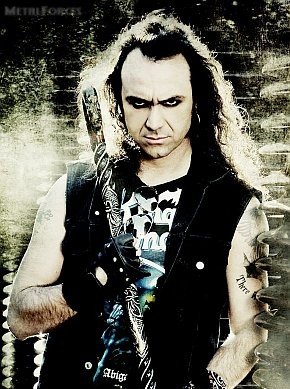
|
“Besides being a great technician and a great producer, Tue also fully understands our songs. He knew very well that the Omega sound would have to sound different from the more metal sound of Alpha, and he worked very hard. We were really, really fucking picky with everything, especially with Omega White and the sound of the voices – there were many voices etcetera. I think we came out of the whole process as definitely a winner. We really liked the sounds on the albums, and we really liked the fact that everybody from the label to the graphic designer were not just working professionally with us. They were working on something they believed. For me, that shows that everybody was very committed to make something that was not just another Moonspell album.”
Shot in Nandufe, Tondela in the central region of Portugal, a music video was directed by Filipe Melo for the track ‘Lickanthrope’ (from Alpha Noir). Moonspell had worked with Filipe previously. “That was crazy to do,” the frontman laughs. “We did our last few videos using CGI and chroma, and we wanted to come back to something more real this time. We had this old friend that worked with us on the video ‘I Will See You In My Dreams’ for the movie of the same name, and it was like a zombie video where we were playing and just defeating zombies. They were trying to kill us, and we’d kill them back. Ten years on from that video, I called him up and said ‘We wanna do a new Moonspell video.’ It’s very inspired by the wolfman, and the old Hammer Horror movies. There’s a graphic version of the Big Bad Wolf meeting Little Red Riding Hood. A couple of days later he called me up, and said ‘Right, I’m in but only if you allow me to have more money for the budget.’ He then said ‘I want to make you the first Portuguese werewolf movie,’ so it all came down to that idea. I wanted something more simple, like something in the atmosphere of From Dusk Till Dawn (1995) with the band playing.
“I knew that Filipe though would come with extra ideas to make the video not a regular one, but something brilliant. I think it’s one of the best videos we’ve done so far, and it was also the one that we suffered for the most because it was 20 hours of shooting. There was glue on my face, hair, and werewolf teeth, but I think the result is really good because it’s also a tribute to a lot of movies. If you’re into movies you’ll recognise From Dusk Till Dawn, you’ll recognise Indiana Jones (Raiders Of The Lost Ark, 1981), you’ll recognise The Deer Hunter (1978), The Wolf Man (1941). I think it was a great thing for us and also for Filipe, because he is a cinema fan and I’m a cinema fan as well. Movies in a way also inspire me to write music, and we’ve already contributed to some soundtracks here in Portugal. It’s quite exciting. From what I’ve seen, it’s really good and I think it’s really old school. Everything in there is real; the set, the female dancers. The prostitutes weren’t real, but they were actresses (laughs). The Wolf Man, you name it. It’s really a tribute as well to all the supernatural figures that can be found in literature and in cinema.”
‘Lickanthrope’ is uniquely titled, the word traditionally spelt as ‘lycanthrope.’ “I’m glad somebody noticed, so thanks,” Fernando chuckles. “It’s just a game of words. ‘Lickanthrope’ is a song that has a lot of sex involved, and there’s a lot of sensual activity going on. I tried to add spice by not using the correct spelling, because ‘lick’ can mean when you lick someone. The song has these sensual feelings about it, and it wouldn’t sound as sexual if it was traditionally spelt. That’s why I made this little twist, in order to convey more the meaning of the song.”
‘White Skies’ was selected to feature in Omega White’s inaugural music video. “It’s different from the ‘Lickanthrope’ video, because I wrote the script together with the production team,” the singer reveals. “I wanted something really simple. We used two sets. It’s just the band playing the song in black and white; the video just goes between the band playing in a room, and a party of Portuguese suicide girls. They just go in a room and interact, have a pillow fight, and all of that. It’s a more clichéd video we’ve never done, but I think this Omega style – especially the song ‘White Skies’ – really relates to that. It’s great because we had no money to do these videos, but a lot of people just pitched in, wanted to do it, and wanted to work with Moonspell.”
Alpha Noir and Omega White are done and dusted now of course, and Fernando is “more than satisfied. There’s some artists who don’t listen to their albums and don’t care, but I’m listening very heavily to this album. I’m very proud because Moonspell has been around 20 years, and we’ve done a very remarkable album in a time where everybody is saying that music is dead and nobody cares about a double-album. They just wanna buy songs on iTunes. I refuse to live in this reality. People still have the time to listen to music, and they still want to make the compromise or the sacrifice of making an album which I think is something that you have to do when you are a fan of music and a fan of a band. Even if you pay £20 for a record, you can have a priceless experience. Nobody ever talks about that. People just wanna put a price on everything, and I think music is way beyond that. It’s way more romantic than that, so I think we have achieved our main goal which was to have a good representation of ourselves.
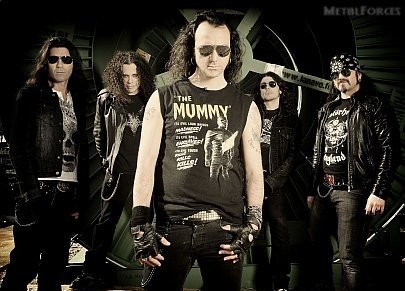
|
“We went so far as to make two albums to feed our hunger for this self-indulgence, these things that musicians have to express. I would say that our expectations are always realistic. I know that Moonspell isn’t the biggest band in the world, but not the smallest as well. Coming out of Portugal, I think we’ve gone to places that nobody here in our small country has gone. We have a full agenda of touring in Europe; we’re going on the Barge To Hell metal cruise, and there are a lot of festivals as well as a lot of shows. I think things are shaping up, and I’m really enthusiastic about things. We can play these songs live obviously, because that’s where you get the real value of the songs and I think that will also be a great experience. That continues the cycle we initiated in 1992 when we changed our name from Morbid God.”
Alpha Noir was released in Europe on April 27th, 2012 and subsequently in North America on May 8th, all through Napalm Records.
Interview published in May 2012. All promotional photographs by Paulo Moreira.
Related Posts via Categories
- MOONSPELL – A Taste Of Live Eternity (August 2018) | Features / Interviews @ Metal Forces Magazine
- MOONSPELL – A Dying Breed, Part One (March 2015) | Features / Interviews @ Metal Forces Magazine
- MOONSPELL – A Dying Breed, Part Two (March 2015) | Features / Interviews @ Metal Forces Magazine
- MOONSPELL – Alpha Noir (2012) | Album / EP Reviews @ Metal Forces Magazine
|
|





